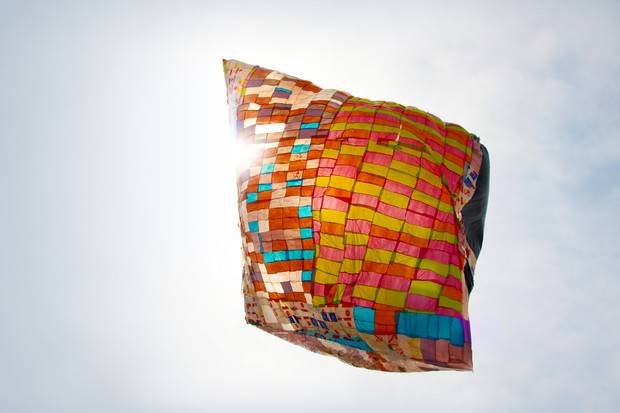Brian Eno's literary recommendations to rebuild society
The anthologies of would-be deserted islands are substituted by the pillars of a future world based on a carefully selected book collection.
Artists and authors often get asked what books or records they’d take with them to a deserted island. On principle, this is naturally an extreme anthology: urgency and tragedy guide its selection. It’s these books or none at all, now or never. However, the (sadistic exercise) of the selection becomes nutritious and generous when the question is not “what books would you take to a deserted island”, but “which books would you use to rebuild civilization?”
The utopian character of this endeavor is not subordinate to anything other than our imagination: utopian literature is founded on the inexistent, what cannot exist, the world of the future, always unreachable, that synthesizes the residues of our mistakes. It’s for that improbable reader of the synthesis that the cosmic probe with the cultural DNA of our planet, imprinted on a golden disc, was launched into space, but it is also the motivation behind the Manual For Civilization, a curated library with over three-thousand books which could be used to rebuild a society —if this is ever the case.
Different personalities will suggest a few books. The project base will be funded by the Internet Archive and crowdfunding (which hopes to raise over $100 thousand dollars). Among those who have collaborated with the archive we can find the great evolver of electronic music and virtual inventor of ambient, Brian Eno. Philosophy, science, theatre, critical thinking and history of art are some of the pillars the musician has chosen for his selection. These are his twenty recommendations for the future:
Seeing Like a State by James C. Scott
The Mind in the Cave: Consciousness and the Origins of ArtNew Window by David Lewis-Williams
Crowds and Power by Elias Canetti
The Wheels of Commerce by Fernand Braudel
Keeping Together in TimeNew Window by William H. McNeill
Dancing in the StreetsNew Window by Barbara Ehrenreich
Roll Jordan Roll by Eugene D. Genovese
A Pattern Language by Christopher Alexander et al
The Face of Battle by John Keegan
A History of the World in 100 ObjectsNew Window by Neil MacGregor
Contingency, Irony and SolidarityNew Window by Richard Rorty
The Notebooks by Leonardo da Vinci
The Confidence Trap by David Runciman
The Discoverers by Daniel Boorstin
Mother Nature: A History of Mothers, Infants, and Natural SelectionNew Window by Sarah Hardy
War and Peace by Leo Tolstoy
The Cambridge World History of Food (2-Volume Set) by Kenneth F. Kiple & Kriemhild Coneè Ornelas
The Illustrated Flora of Britain and Northern Europe by Marjorie Blamey & Christopher Grey-Wilson
Printing and the Mind of Man by John Carter & Percy H. Muir
Peter the Great: His Life and World by Robert K. Massie
Related Articles
When ancient rituals became religion
The emergence of religions irreversibly changed the history of humanity. It’s therefore essential to ask when and how did ancient peoples’ rituals become organized systems of thought, each with their
Seven ancient maps of the Americas
A map is not the territory. —Alfred Korzybski Maps are never merely maps. They’re human projections, metaphors in which we find both the geographical and the imaginary. The cases of ghost islands
An artist crochets a perfect skeleton and internal organs
Shanell Papp is a skilled textile and crochet artist. She spent four long months crocheting a life-size skeleton in wool. She then filled it in with the organs of the human body in an act as patient
A musical tribute to maps
A sequence of sounds, rhythms, melodies and silences: music is a most primitive art, the most essential, and the most powerful of all languages. Its capacity is not limited to the (hardly trivial)
The enchantment of 17th-century optics
The sense of sight is perhaps one the imagination’s most prolific masters. That is why humankind has been fascinated and bewitched by optics and their possibilities for centuries. Like the heart, the
Would you found your own micro-nation? These eccentric examples show how easy it can be
Founding a country is, in some ways, a simple task. It is enough to manifest its existence and the motives for creating a new political entity. At least that is what has been demonstrated by the
Wondrous crossings: the galaxy caves of New Zealand
Often, the most extraordinary phenomena are “jealous of themselves” ––and they happen where the human eye cannot enjoy them. However, they can be discovered, and when we do find them we experience a
Think you have strange reading habits? Wait until you've seen how Mcluhan reads
We often forget or neglect to think about the infinite circumstances that are condensed in the acts that we consider habitual. Using a fork to eat, for example, or walking down the street and being
The sky is calling us, a love letter to the cosmos (video)
We once dreamt of open sails and Open seas We once dreamt of new frontiers and New lands Are we still a brave people? We must not forget that the very stars we see nowadays are the same stars and
The sister you always wanted (but made into a crystal chandelier)
Lucas Maassen always wanted to have a sister. And after 36 years he finally procured one, except, as strange as it may sound, in the shape of a chandelier. Maassen, a Dutch designer, asked the










